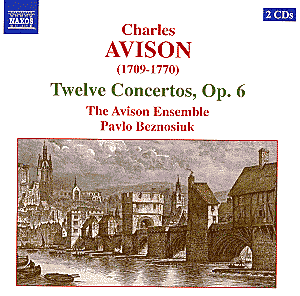Sovereign in the north-east
of England, and Newcastle’s reigning
musical eminence grise, it’s always
been a puzzle as to why Avison’s name
still figures so tentatively in the
catalogues, let alone the concert hall.
His position as one of the most prestigious
of all British concerto composers is
certainly not one simply confined to
the eighteenth century. Possibly one
of the reasons for his comparative neglect
lies in his being thought of as an imitator
and transcriber rather than a musical
instigator, a follower of the Italianate
concerto tradition and not an individualist
in his own right. Certainly he was profoundly
influenced by Corelli and Geminiani
– indeed he went so far as to proclaim
the latter superior to Handel, a provocation
that inevitably led to an exchange of
journalistic views. And many of Avison’s
most well known pieces are modelled
on source works by, say, Rameau (the
Six Sonatas Opp 5, 7 and 8) whose music
Avison did much to promote in England.
It was inevitable,
given that he studied with him, that
Avison should so admire Geminiani and
as organist, composer, writer and mover
and shaker in Newcastle he did much
to promote the virtuoso Italian tradition
of string writing. The Op.6 Concertos
pay tribute both to that tradition and
to Avison’s imagination and expressive
depth. The Concertos range from unapologetic
Italianate fugal writing to, in the
final Concertos, an awareness of the
contemporary change toward sonata form
in the concerto grosso. Copiously marked
with an array of expressive markings
these Concertos repay a sensitive approach
to bring out their emotive heart, along
with their Handelian gait and Corellian
impetus. I liked the Avison Ensemble’s
fine approach to tempo – not over pressed
– in the First Concerto and the reduced
dynamics in the Adagio section, a microcosm
of their approach in general. Rhythm
and apposite weight of bowing are notable
in the Maestoso opening of the Fifth
where they also cultivate (in the finale)
a fine and palpable sense of chamber
intimacy.
Avison’s Sixth Concerto,
so explicitly reminiscent of Italianate
procedure as filtered to him through
Geminiani, sports an especially fine
opening movement (solo violin over cello
tread) that is if anything outdone by
the third movement Adagio where the
fine accents, rise and fall of the line
and mysterious writing are notably well
explored by the Ensemble. Avison strikes
perhaps his starkest note in the grave
nobility of the Tenth Concerto’s Adagio
and his most delicate in the Allegro
of the Eleventh – splendid refinement
– where he also gives us yet another
example of his "affect" in
the expressive slow movement.
In all these things
the Avison Ensemble do their namesake
proud. Articulation is full of clarity,
rhythms are buoyant; if occasionally
one would like ideally more weight,
then the compensations are those of
stylistic understanding and nuance.
Jonathan Woolf


